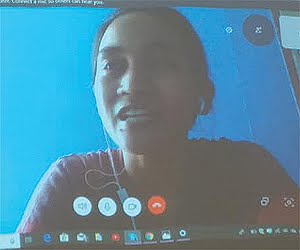The Duterte administration has caused the violent deaths of 48 indigenous people and 169 political killings, a tribal leader has claimed.
Piya Macliing Malayao, secretary general of the Katribu Kalipunan ng Katutubong Mamamayan ng Pilipinas, also accused three government agencies of colluding to abet open pit mining, despite an ban imposed on former Department of Environment and Natural Resources secretary Gina Lopez.
 |
| Piya Macliing Malayao |
She spoke live via Skype from the Philippines as guest speaker of the Tribal Filipino Sunday second anniversary celebration on Oct 21 in Annie Li Hall of the St John’s Cathedral on Garden Road, Central.
Malayao alleged that 16 aerial bombings that targeted Lumad areas in Mindanao and Cordillera communities had affected 7,000 people.
Worse, she said, the military planes were using phosphorous bombs, which have been banned internationally because they cause greater damage than conventional bombs.
 |
| Tribal Filipino Sunday with various Cordillera group leaders . |
schools because they allegedly operate without government permits and teach the students to rebel against the government.
“Get out of there, I’m telling the Lumads now. I’ll have those bombed, including your structures,” Duterte was reported as saying in a press conference, as he vowed to retaliate against communist rebels who had been allegedly attacking bridges and government schools.
“I will use the armed forces, the Philippine air force. I’ll really have those bombed … because you are operating illegally and you are teaching the children to rebel against government,” he reportedly said.
Malayao said at least one classroom has been torched in more than 140 various forms of attacks on schools that have forced the closure of about 70 Lumad schools.
She said the schools had been put up by church groups in cooperation with indigenous and other organizations because there are no government schools in Lumad areas. As a result, more than 2,600 young Lumads have been deprived of education.
Evacuations caused by military operations in indigenous communities in two years have allegedly reached 53 incidences that have affected more than 27,000 people.
Malayao, a granddaughter of Cordillera woman activist Mother Petra Macliing who played a crucial role in resisting the Chico River Dam project during Martial Law, scored Duterte’s Build, Build, Build program, saying it would displace indigenous communities and ruin their cultural heritage.
She said the proposed 9,000-hectare New Clark City that will straddle Pampanga, Tarlac and Zambales will dislodge Aetas from their ancestral homeland.
The China-funded Chico River Pump Irrigation Project in Kalinga, Balog-balog Dam in Tarlac and New Centennial Resource-Kaliwa Dam at Panay River Basin Integrated Development Project in Panay will be set up in indigenous areas, Malayao said.
At present, giant mining companies continue to operate in more than 520,000 hectares of indigenous ancestral land while agro-industrial plantations owned by foreign companies are expanding in Mindanao and Palawan under deals signed with Duterte, she said.
These include 120,000 hectares earmarked for palm oil plantations in Mindanao and Palawan, in addition to 500,000 hectares already occupied by plantations on Lumad territory in Mindanao, Malayao said.
She said all indigenous communities should unite and oppose government development projects that will deprive them of their ancestral lands with the use the military in order to hand them over to foreign companies.
Suportahan natin ang ating sponsors:















































